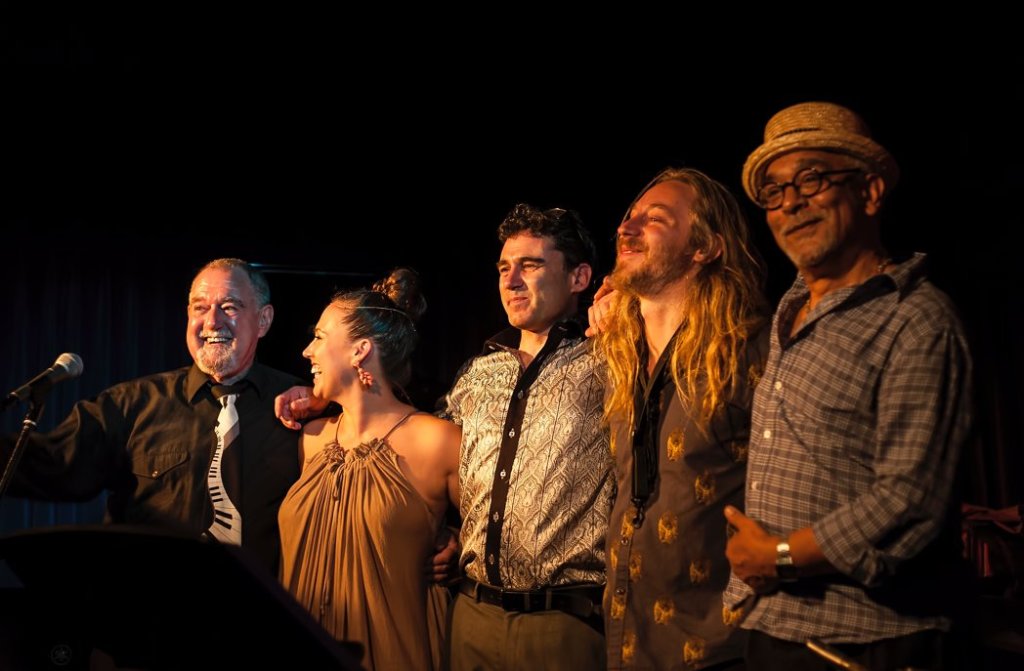It is a bit ironic that a band paying tribute to South African Jazz is performing at a former police station, but there is nothing ironic about the Royal Swazi Spa and their loving, enthusiastic, honest approach to music. Initiated by the now legendary duet of pianist Howard Belling and drummer Brian Abrahams (their credentials inevitably seem like name-dropping: Ray Charles, Sarah Vaughan, Ronnie Scott, Abdullah Ibrahim – you get the picture) who effectively breached Apartheid restrictions, in order to make music together, the band took its name from the eponymous hotel in Swaziland, where they performed on a regular basis. Now based in Melbourne, the Royal Swazi Spa continue to offer a rare insight on the rich, wonderful signature sound of South African Jazz. The current line-up includes Nick Lester on sax, Dave Marama on the guitar and Howard Belling’s own talented offsprings, bassist Zvi and vocalist Fem, which gives the band an added feature – that of a family affair. On Saturday they have a concert at the Kew Court House (the former prison mentioned in the beginning) and Fem Belling would like you to be there. As if there’s a way to say no to her.

How does your work with Royal Swazi Spa fit in with your other artistic endeavours?
South African Jazz was the music I grew up on; by default, I feel it influences a huge part of my musical choices. The band plays sporadically, so it is a real treat when it does. On occasion, we do a stripped back version of tunes in my quintet.
How would you describe your music to someone not familiar with it?
Music that makes your soul smile. A melting pot of African artists combine to pay homage to the infectious music of the history of South African jazz and township music.
There are political undertones to the Royal Swazi Spa story; how does this legacy ‘translate’ to the current political context?
As Fela Kuti said, “music is the weapon of the future.” The music we play is steeped in respect for the sound of oppression coming out of the townships of south Africa during the Apartheid regime. Music was a central feature of the urban culture that developed in Johannesburg; It was centred on beer-brewing and shebeens (illegal bars).
Jazz was an emotional means of resistance and the Apartheid government realised this, so in the 1960s they began to censor radio stations, threaten artists, and ban songs, hence marking the beginning of an era of repression that lasted for 30 years.
Jazz music should always be a medium for freedom of speech against regimes and political acts that see abhorrent treatment of humans. Sadly, today this is as relevant as it was then.
What has the highlight of the Royal Swazi Spa been so far?
Performing a live stream at Nelson Mandelas funeral was a poignant and emotional day for the band. My first eligible election was South Africa’s 1994, first democratic election in years and I stood in a queue with the rainbow nation and cast my vote for Madiba. I am so honoured for this band to been part of his salute.
What is the single most important thing that you have learned from your father?
I learned how to drive a car, I learned a few wonderful (read terrible) puns and most extraordinary, I learned the magic of music. And still to this day I get to create melody and harmony with him.
If you could pick any artist to work with the Royal Swazi Spa, who would that be?
Oh wow – I phone a few of the band members for this one. We have Vusi Mahlesela, Manu Dibango, Siya Makuzeni to name a few.
What is your aspiration for the band’s future?
To continue to make wonderful music and maintain this incredible genre through hommage and original tunes.
What would you say to invite someone to the Kew Court House concert?
Turn the TV off, grab your coat and come see some live South African music (on your doorstep). You will be smiling all week.
Which song best describes your current state of mind?
With the current tumultuous political scene in South Africa and its corrupt president, Jacob Zuma, it would have to be ‘Soweto Blues’.


